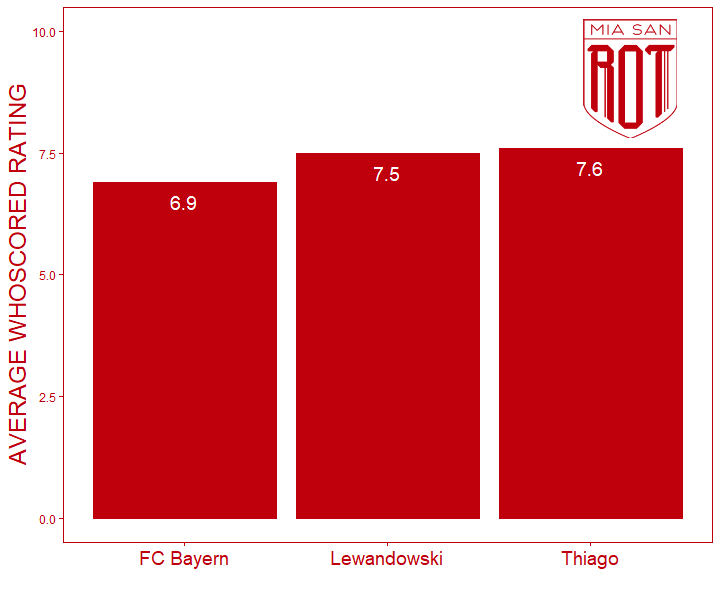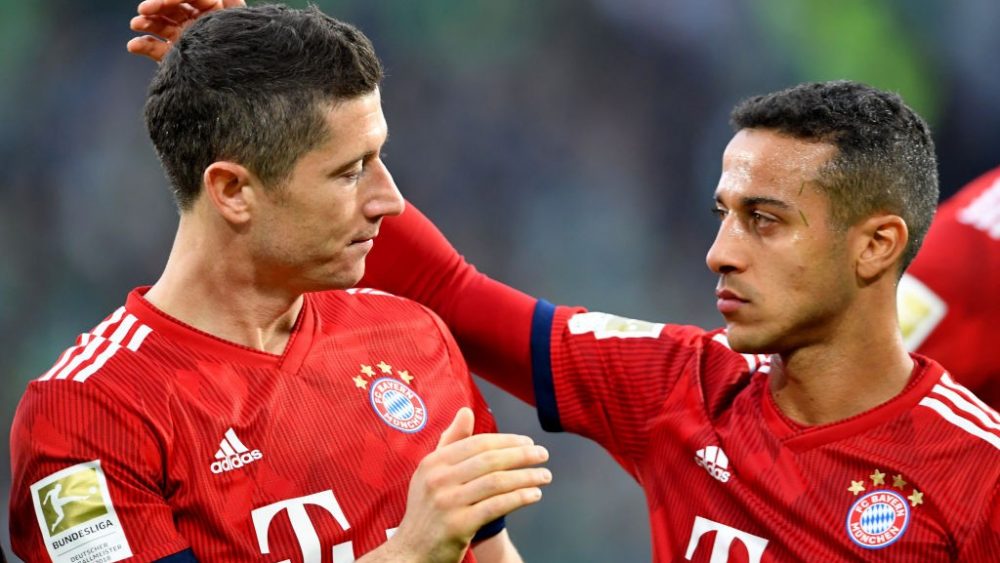The myth of invisibility
The accusation
When Daniele Orsato blew the final whistle after 93 minutes of game time on that Wednesday evening in March 2019, FC Bayern were eliminated from the Champions League – yet again. After a goal-less draw in the first leg at Anfield, FC Bayern were defeated 1:3 by the eventual champions Liverpool FC in their second match and thus dropping out at the round-of-16-stage already. Once again the final would take place without Bayern. But in contrast to the previous years, you could not use neither the referee nor a higher football power as a scapegoat – the defeat had been too comprehensive.
What were the reasons? Besides a strong opponent and Kovač’s tactics possibly being too cautious, Thiago and Lewandowski were made out as the primary culprits.
For example, Eurosport evaluated Lewandowski’s performance as follows: ‘For seven knock-out matches now, Lewandowski hasn’t scored. After five seasons with the club he has only contributed eleven goals in this critical phase of the season. Even when he did, ‘Lewy’ only scored against supposedly small teams (one goal against Schachtjor Donezk, two goals against Porto, two goals against Besiktas). Against Liverpool, he once again caught one of ‘those nights’. No connection to the game, no special moments, no goal threat.’ Meanwhile, FAZ noticed ‘completely invisible stars like Thiago’.
It comes as no surprise that, time and again, these two become targets of public criticism: Both are top stars. And while young stars like Kimmich and Süle are still enjoying puppy license, other seasoned stars already have some significant silverware to show.
So, we have Thiago, with his seductively beautiful play who might be able to shine with step-overs and a series of short passes against weaker opponents, but lacks the tenaciousness for big match situations. And then we have Lewandowski, the selfish striker, who follows up a hattrick against Freiburg with no goals at all against Madrid.
The examination
But is there something to this accusation? Do both of them really not turn up in big matches or does an emotionally charged narrative disregard facts here, as it so often does ? To find an answer we’ll examine their performances in such big games as objectively and transparently as we can. The attempt isn’t easy. The following points have to be analysed:
- How do you define big matches?
- How do we measure whether a player delivers an ‘invisible’ or outstanding performance?
- What period of time are we looking at?
We define big matches as matches exhibiting the following criteria: DFB Cup finals, all Bundesliga matches against Dortmund and Leipzig (since these two teams have been consistently successful in recent times as opposed to all other Bundesliga sides), Champions League matches against sides with an Elo value higher than 1800 (this approximately represents the threshold of being considered one of Europe’s top ten teams).
For performance evaluation we’ve chosen the grades of WhoScored. WhoScored’s grading system ranges from about 4 to 10, with 10 representing the top score. At the beginning of every match a player is evaluated with a 6.0. On this starting point, every successful action increases the score and every unsuccessful action decreases it. The grading system is not perfect but it is objective, observable and comparable. To illustrate the reasoning behind this approach: In the past season Lewandowski, Thiago and Kimmich were ranked the three best players in Bayern’s squad by WhoScored – an assessment which will be in keeping with most people’s subjective impressions.
Considering the time period of our examination, we’ve chosen the last three years: this should lead to a sufficient sample size without using data which one might consider too old. Because even if Thiago should have had an invisible performance as young player back in 2014, would this be a solid base for his current evaluation as a leading player of the side? Hence, we have an examination period spanning 26 games – 13 of which were won by Bayern, with 3 draws and 10 losses. It is a sufficiently sized set and one representing an appropriate average performance of FC Bayern since a set representing a significantly higher average Bayern performance could mean there are too many easy matches contained in the sample.
The evaluation
Of the 26 FC Bayern top games in the past three years, Thiago only missed three. For the 23 matches in which he participated, he received an average grade of 7.6 by WhoScored. This is an outstanding grade. Lewandowski missed only two games – both of which were defeats by the way – and achieved an average grade of 7.5, again an exceptional score. To put the results in perspective, compare their grades to the average grade of the entire Bayern squad, which is 6.9. Thiago and Lewandowski have, on average, a significantly better score than their teammates.

Arturo Vidal, a player whose will to win is beyond question, scores an average of 7.0 before his move away from the club. To illustrate Thiago’s and Lewandowski’s performances even further one might have a look at the last season which should still be fresh in the memories of most readers. In Europe’s top five leagues (France being number 5) for the 18/19 season WhoScored awarded only 21 players in total with an average of 7.5 or higher, including Thiago, Lewandowski and Kimmich. These are the top 10 players of the last season:
| Highest rated players in the top 5 leagues | Average WhoScored Rating 2018/19 |
|---|---|
| Lionel Messi (Barcelona) | 8,5 |
| Kylian Mbappé (Paris) | 8 |
| Téji Savanier (Nimes) | 7,9 |
| Eden Hazard (Chelsea) | 7,8 |
| Cristiano Ronaldo (Juventus) | 7,7 |
| Robert Lewandowski (Bayern) | 7,7 |
| Alejandro Gómez (Atalanta) | 7,6 |
| Nicolas Pepe (Lille) | 7,6 |
| Raheem Sterling (Man City) | 7,6 |
| Thiago Alcantara | 7,6 |
Result and outlook
The myth of not turning up, of becoming ‘invisible’ is very likely unsubstantiated and, as it so often happens in football, seems to be spawned by emotion after lost games as well as unrealistic expectations. Thiago and Lewandowski are key performers at FC Bayern, in big games as well as easy ones. If they happen to win the Champions League in the coming years, their post-career evaluation will take a similar development to the ones of all other legends und they will generally be remembered for their big wins. And even if they don’t manage to win the most important piece of silverware in what remains of their careers, there is always statistical analysis to oppose the myth of invisibility.
Translated by Philip.









